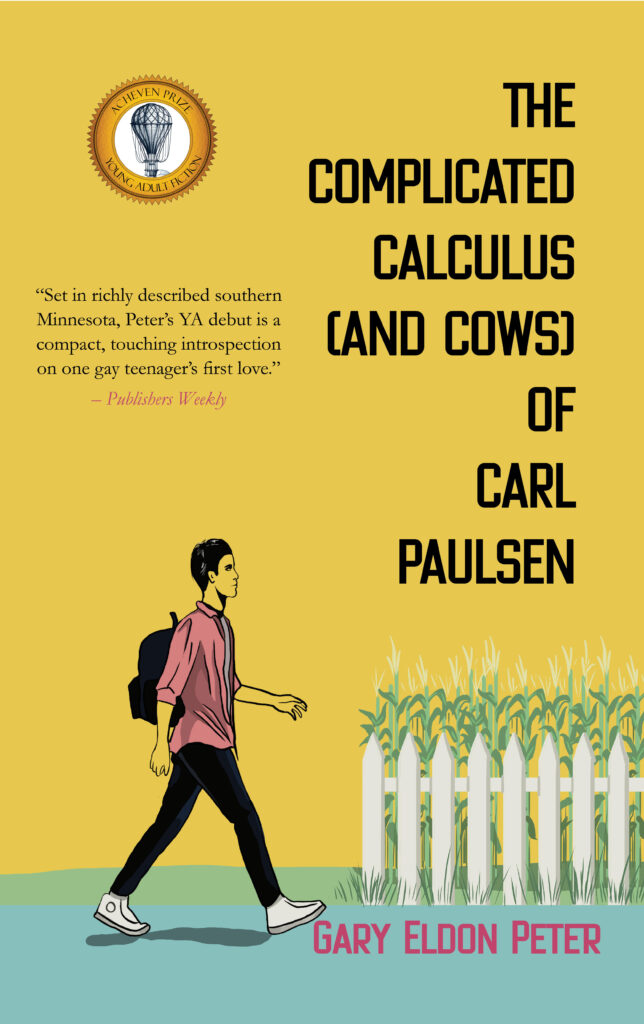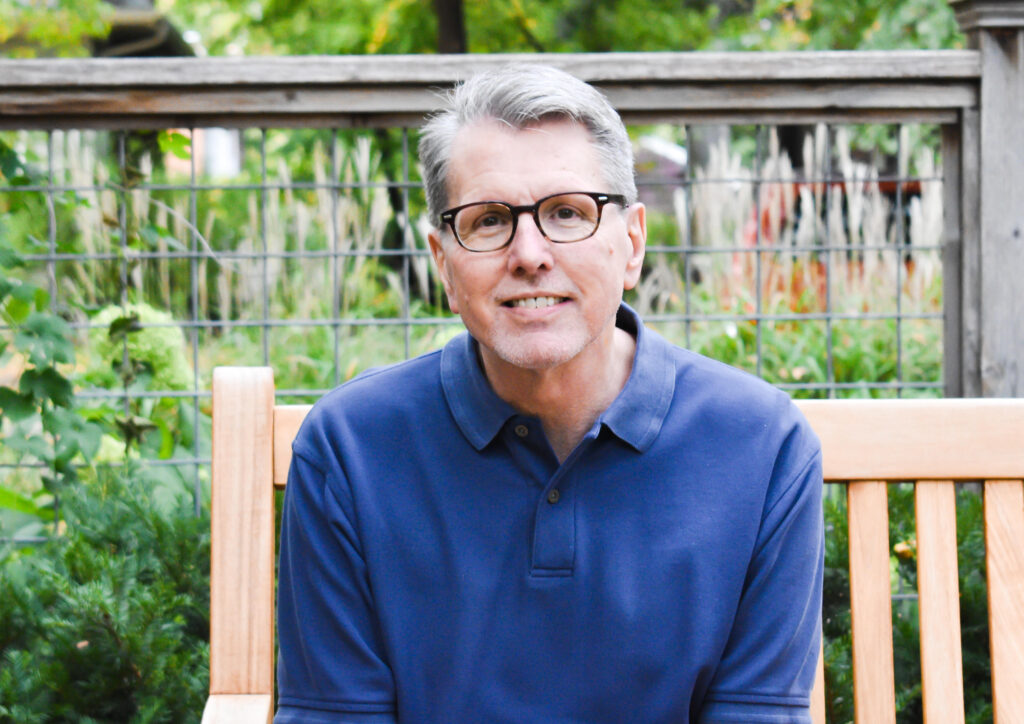Chatting with prizewinning LGBT author Gary Eldon Peter
Get this new LGBTQ author onto your reading list.
Gary Eldon Peter’s debut novel, The Complicated Calculus (and Cows) of Carl Paulsen, winner of the 2020 Acheven Book Prize for Young Adult Fiction, was published by Fitzroy Books/Regal House this month. His award-winning short story collection, Oranges, was published by New Rivers Press in 2018. We sit down with the award-winning author to find out more about his work, and the theme of his gay YA novel.
Tell us a little about your book
Gary Eldon Peter: The Complicated Calculus (and Cows) of Carl Paulsen, a young adult novel. It’s about a gay teenager living on small and struggling Minnesota dairy farm who thinks he’s met the boy of his dreams but it turns out to be a lot more complicated than he realizes. He is also dealing with the potential loss of their farm, which was handed down from his late mother’s family, and the conflicts he has with his father about what to do about it.
Young adult books tend to be popular among adult readers. Why do you think that is?
I’m mindful of the expression that YA books are about young adults but aren’t necessarily exclusively “for” young adults. I think a big part of the reason for that might be because adult readers appreciate seeing their adolescent experiences and selves reflected in literature that likely wasn’t available when they were younger. I think that is particularly true for older LGBTQ+ readers (like myself). In my growing up there were no YA books that portrayed what it was like to be a gay teenager and the many challenges that come with that. As I was writing the novel I often thought about what it would have been like had my own book been out there for me, and how it might have made me feel better about who I was and what I was struggling with. That was really a lot of my motivation for writing it in the first place.

What do you hope that readers will get out of reading your book?
It’s pretty basic, but LGBTQ+ people are everywhere, in all communities. Also, acceptance and understanding for LGBTQ+ individuals not living in urban areas can still be a challenge despite the significant progress we have made. I hope that readers of whatever age but particularly LGBTQ+ kids will appreciate their story being told, will feel “seen,” and know that they are not alone.
You are the author of a short story collection and a novel. What are the particular challenges of each form?
They are equally challenging in their own ways, and I think it’s easy to assume that because a short story is, well, shorter, that it’s somehow less difficult when it’s not (and I count myself among those who have made that very wrong assumption). For me, with a story, it’s finding that key “moment” where something changes or turns and then figuring out what flows from that. It doesn’t have to be big, but it has to be meaningful. Finding that something requires a lot of thinking, writing, and re-writing until you have it. With a novel, it’s sustaining multiple story lines and juggling a larger cast of characters through many pages and chapters, and maintaining some sort of tension that keeps the reader interested…and keeping it all in your head as you are doing it. That, and presenting the reader with compelling questions that, if they stick with you, they will eventually get answered.
Which authors have influenced or inspired you?
A lot of writers have influenced me, but no one more than Raymond Carver, at least when I was starting to write fiction. I was blown away with how he could express such deep levels of emotion with so few words. I read every Carver story that I could get my hands on, and I think I was under the very mistaken impression that he made it look “easy.” I can see that in my very early attempts at short stories where I tried to imitate him with fairly awful results. Once I was in graduate school I discovered a lot of other writers that I admired, including Alice Munro, whose stories do such phenomenal things with time and are so novelistic. Her work really helped me see the possibilities for what a short story could be. And as a gay male writer, I admire the novels and stories of Edmund White, Andrew Holleran, Garth Greenwell, Allan Gurganus, David Leavitt, Brandon Taylor, and many others who have inspired me.
How did you start writing?
As a child I daydreamed a lot which I think is an essential quality for someone planning to be a writer, even though it often got me into trouble with some of my elementary school teachers for not always listening and following directions. Sometimes I would try to write the elaborate stories that I created in my head using a very old manual typewriter that we had but getting them from my brain onto paper was a challenge…I was easily distracted and the words would often disappear as soon as I started hitting the keys. But even then I had a feeling that I would be a writer of some sort someday. I was always terrible in math and science but pretty good in English and so I took as many writing classes as I could in high school, majored in journalism in college with the idea of perhaps being a journalist, and then ended up in law school where writing was a huge part of the curriculum and a major part of my work as a judicial law clerk and lawyer after I graduated. But I didn’t really start writing fiction until well into my thirties when I started taking classes at the Loft Literary Center in Minneapolis, near where I live, and where I wrote my first short stories. About six years after those first classes I decided to pursue an MFA at Sarah Lawrence College, where the idea ofwriting seriously and publishing books started to seem like things that could actually happen.
You mentioned getting an MFA as part of your writing journey. What was your experience of that? Do you think it’s something writers should do to learn and perfect their craft?
I think it’s very much an individual decision, and of course there are many great writers both past and present who never got an MFA! For me, though, it was really pivotal. I also think it made a difference for me to wait until I’d done a lot other things and had some “life” to draw upon for my work. I wrote almost everyday, I met amazing classmates who were supportive and constructive readers and who became lifelong friends, and I worked with teachers who cared about my work and helping me grow. It’s no exaggeration to say that getting an MFA changed my life and how I viewed myself as a writer. I also lived near New York City during that time, and that too, with its amazing cultural opportunities with theatre, museums, readings, and other things, was a huge part of my MFA experience.
What’s the best advice you’re ever gotten as a writer?
Right before my first book, Oranges, was about to be published, a former teacher and mentor who I greatly admire told me that this major moment in my life would be one of the most exhilarating and saddest at the same time—exhilarating because it would be a goal achieved but also sad because the moment happens in an instant and then it’s over and your life goes on as it did before. Enjoy it as much as you can, she said, but don’t let it be everything. A book is a wonderful thing but it, and how other people view it and respond to it, doesn’t define you as a person or your worth. I didn’t quite know what she meant at the time but after the book came out I knew exactly what she was getting at. As I prepare for my second book to be published, I feel much more ready for what to expect and how I’m going to feel, and I’ve been forever grateful to her for her honesty and wise words.
For more information: https://www.garyeldonpeter.com
About Gary Eldon Peter
Gary Eldon Peter is the author of two works of fiction: Oranges, a linked short story collection, and the novel The Complicated Calculus (and Cows) of Carl Paulsen, winner of the Acheven Book Prize for Young Adult Fiction. Oranges received the Gold Medal for LGBT+ fiction in the Independent Publisher Book Awards, the Midwest Book Award, and was a finalist for the Minnesota Book Award and the Flannery O’Connor Award for Short Fiction. His work has appeared in numerous literary journals and has been performed on the public radio program Selected Shorts. He earned an MFA in Creative Writing from Sarah Lawrence College and is a faculty member at the University of Minnesota.






